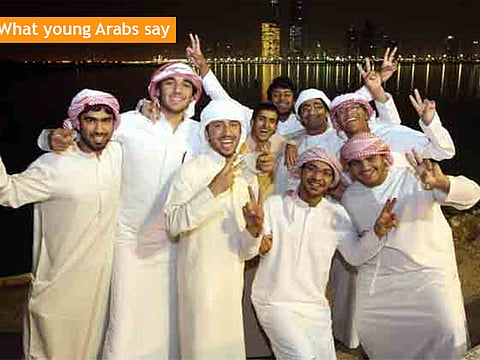Young Muslims reject Daesh, Al Qaida as perversion of faith, survey finds
Committed to Muslim identity, generation acknowledges need for renewal in Muslim discourse

Abu Dhabi: A majority of Muslim millennials say terrorist groups such as Daesh and Al Qaida are a complete misrepresentation of Islam, according a survey released here on Tuesday.
At the close of last year, Zogby Research Services (ZRS) conducted a face-to-face polling of 5,374 Muslims between the ages of 15 and 34 in eight Arab countries: UAE, Saudi Arabia, Kuwait, Bahrain Morocco, Egypt, Jordan, and Palestine. The Futures Initiative at Tabah Foundation, an Abu Dhabi institution that researches issues related to Muslim society, commissioned ZRS to explore attitudes of the Muslim millennial generation, specifically with respect to their attitudes towards religious identity, faith-based leadership, scholarship, religion and politics, personal religious devotion, reform, and religious extremism.
Between 45 per cent and 93 per cent of all respondents say that extremist groups such as Daesh and Al Qaida are a complete perversion of Islam. A vast majority of young Muslims in the UAE (92%), Morocco (93%) and Egypt (83%) believed these extremist groups were a complete distortion of their faith.
They identified “corrupt, repressive, and unrepresentative governments” and “extremist religious teaching” as the key reasons why some people join these groups. Among Palestinians, “foreign occupation” is the number one choice as to why people join extremist groups.
Despite the distorted images of religion caused by the actions of extremist groups, Arab Muslim millennials foresee an important role for their faith in the future of the region.
Further key findings showed that Arab millennials are deeply committed to their identity as Muslims and want this to be known to others. However, there was also an acknowledgement of the challenge of preserving this identity in the midst of modern society.
While majorities in most countries rejected that religion was the source of decline in the Arab world and saw religion as having a key role to play in building their country’s future, they held different views about the role of government in administering religious affairs.
Majorities of young Muslims in Egypt, Kuwait and Palestine were inclined to support the government’s intervention in anything related to religion. In all eight countries, they agreed with government’s intervention in “ensuring that religious discourse is not used to promote violence, incitement and hatred” and in banning movies, TV etc, if they “breach the values of society”.
They see their faith as being compatible with the modern world and therefore reject the notion of ‘reform’.
Substantial majorities of young Muslims in all eight countries, though, agreed that “language used to speak about Islam” and topics and issues addressed by scholars needed to be made more relevant to today’s life, which is why many also believed that Friday sermons were either a “tirade”, “boring” or “the government’s voice”.
They also agreed that religion as it is currently taught and practised respects and empowers women but recognised that there is a need for more women religious scholars and preachers.
Commenting on the report, Abaas Yunas from the Futures Initiative at Tabah Foundation, said, “This is a landmark survey and perhaps the first of its kind to be undertaken in the region. We were driven to do this because religion is an acutely important topic in our region and the wider world today. Unless we have evidence based insights into how our younger generations are thinking about their faith, identity and religious life, then our leadership in the faith-based and policy realms will be unable to meet the demand of the changes and challenges that present themselves ahead.”
Key findings
Despite the actions of extremist groups, Arab youth foresee an important role for faith in the region’s future.
Young Arabs identify strongly with their faith.
Many find it challenging to preserve their religious identity in society.
Living by Islamic ethics and morals, and the political issues in Muslim societies are the two most important aspects of Islam for Arab youth.
They see a role for state involvement in the administration of places of worship, preparations for religious occasions and regulating religious discourse against promoting violence and hatred.
Most do not believe that Islam requires reform, but agree that there needs to be a change in the way religious scholars and preachers speak about faith.
A majority feel that their societies need more active female religious scholars.
They do not necessarily go to religious centres for answers although they see the Grand Mufti or religious scholars as rightful authorities on religious affairs.
Many find Friday sermons to be either a tirade, boring or the government’s voice.
Sign up for the Daily Briefing
Get the latest news and updates straight to your inbox



